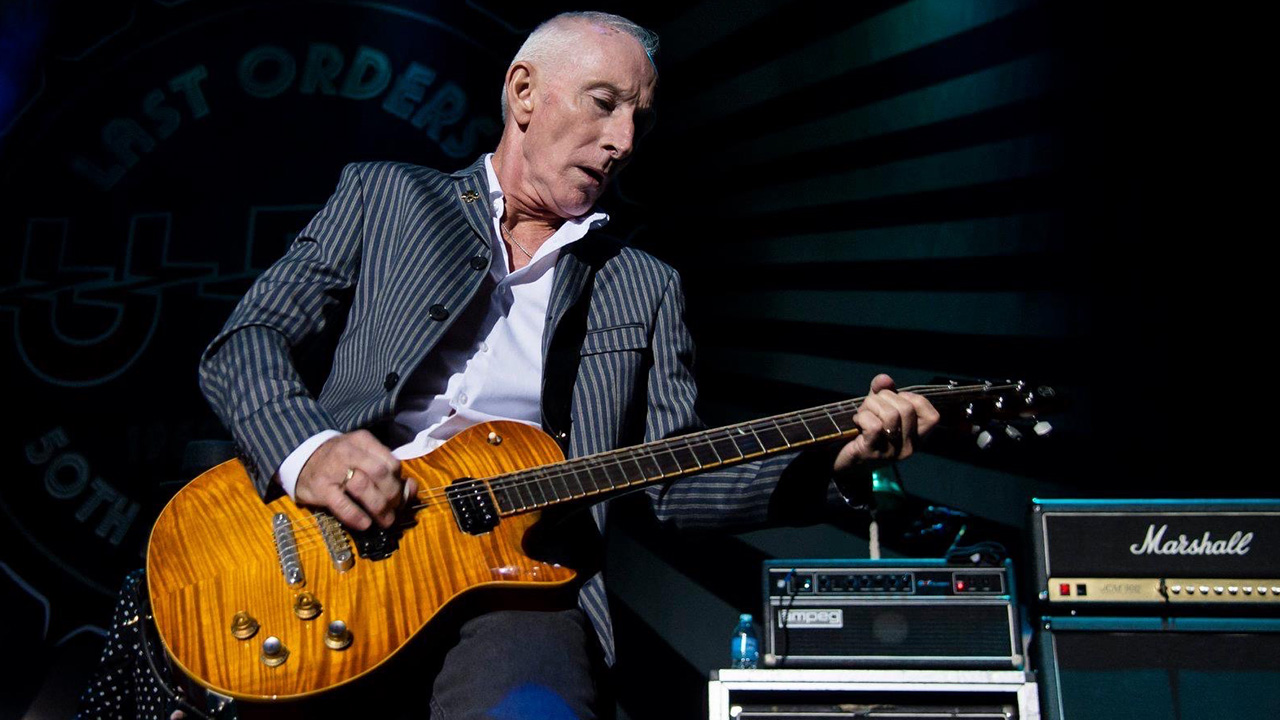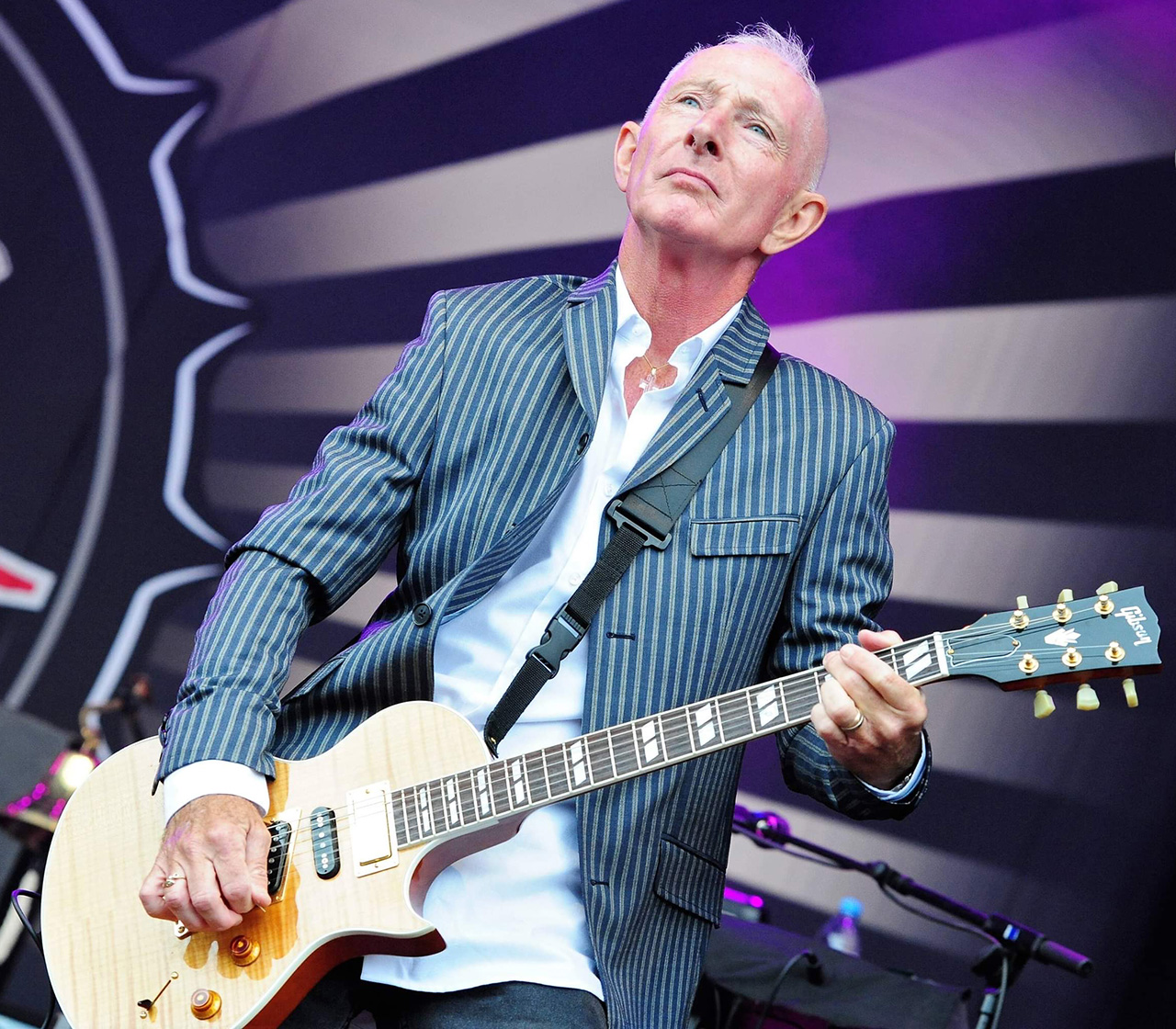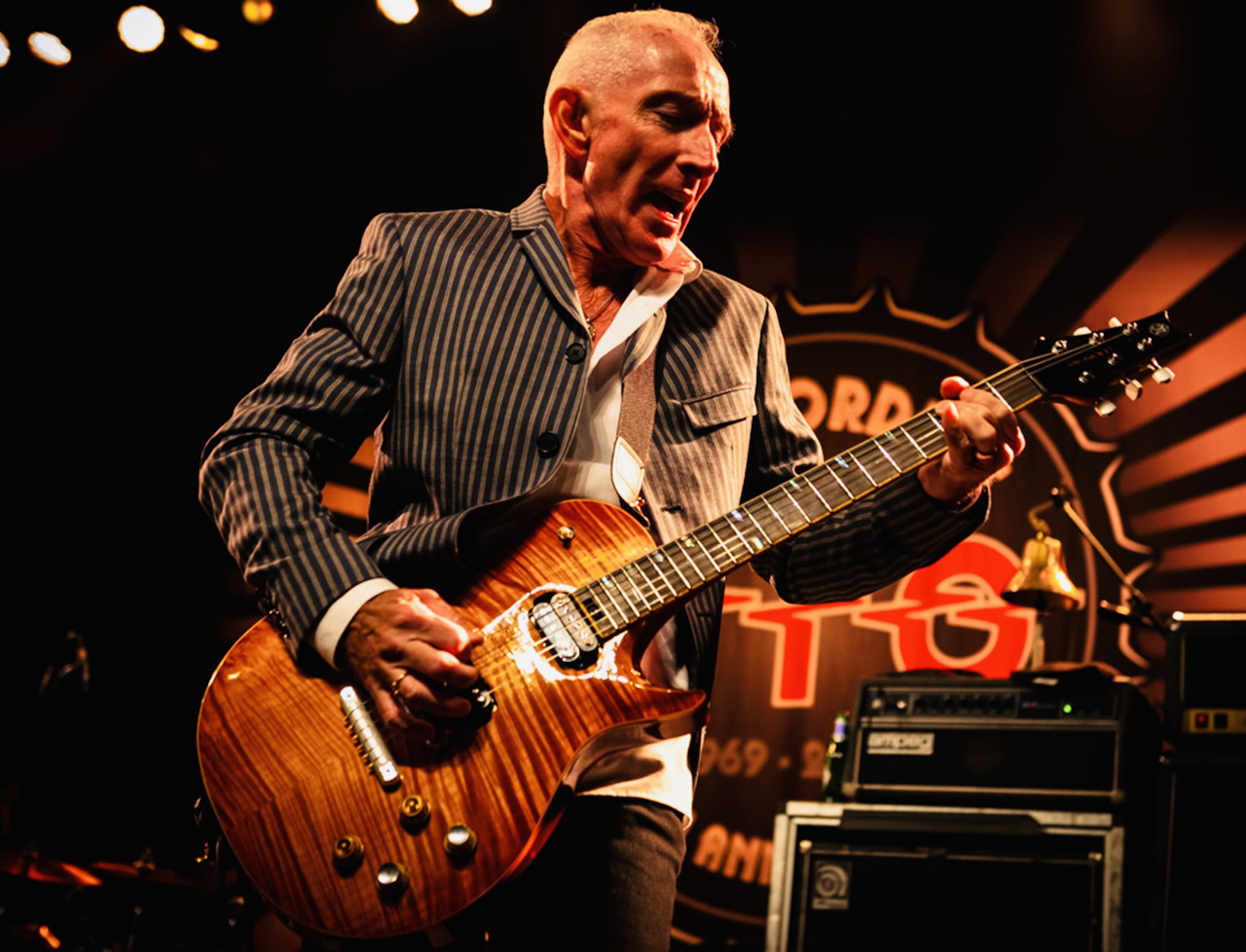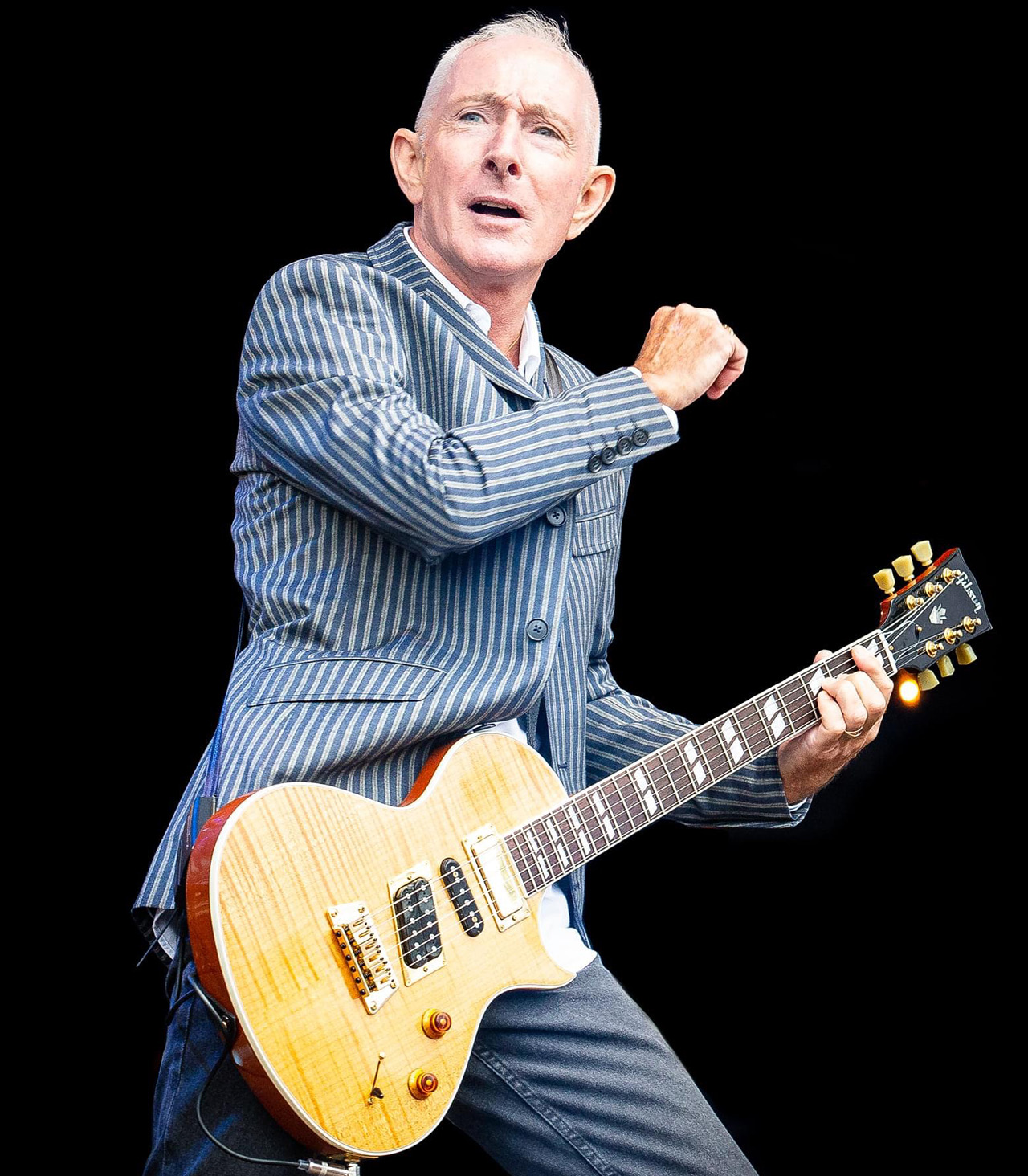
With a deep love for glam rock, Neil Carter became a professional musician at 17 with Gilbert O’Sullivan, before joining UFO in 1981 then riding shotgun with Gary Moore in 1983.
He left the rock world at 30, becoming a teacher of woodwind instruments, then returned for Moore’s final ride in 2010, and then rejoined UFO in 2019. Recently he’s been working singer Phil Mogg’s solo music.
What inspired you to pick up the guitar?
“It was seeing The Sweet on Top of the Pops when I was about 11. I was later given a bass for Christmas and started playing along to records. My mum made me mock-ups of Steve Priest’s outfits – which sounds tragic now! I had a bit of an obsession with glam rock, and then progressed to David Bowie and Roxy Music.”
Was there one guitarist who stuck out most?
“When I heard Mick Ronson play, it just fired my imagination. His tone, his simple, effective licks, his melodies, and his image were an inspiration. I wanted to play lead guitar, but I joined my first band on bass when I was 14. From about 1976 I concentrated on singing and tried to hone my guitar skills.”
What led to joining UFO in the early ‘80s?
“I’d been in a band called Wild Horses, which had got me vaguely known and grounded me as a full-time musician. I used to hang around with Phil Collen of Girl – later Def Leppard – and he suggested that I might be an option when UFO parted company with Paul Raymond.
“I went for a play-through and it was a done deal. I did the three things – guitar, keys and singing – that my predecessor had. And I was a quick learner, which helped as our first gig was headlining the Reading Festival in three weeks’ time.
“We also clicked personally, although I was quite shy and retiring back then. It did take me a while to gain confidence; they were a big band, so it was a huge step up for me.”
How did you record The Wild, The Willing and The Innocent?
“All the backing tracks were done when I joined, so my contribution was the backing vocals and sax solo. I might have added a couple of keyboard bits, but not much. I was feeling my way with that one as I was very new. But I was taking part, and I suppose as a fresh ear I was useful to the process.
“It’s a great album with excellent songs on it. We recorded it at Air Studios in London. I remember having an out-of-body experience chatting with George Martin and Linda McCartney, when they wandered in while we were mixing.”
How about Mechanix and Making Contact?
“By then I’d found my feet and had a more me-friendly setup. We ditched the Hammond as it was so heavy, and I bought a double manual Korg organ to play through our souped-up Leslie. I kept the Wurlitzer but got a Prophet 5 for strings.
UFO were half a million in debt when we finished, and no one was banging on the door
“I had a whole host of guitars. There was a Gibson hollow body thing, stuffed with tampons to stop it from feeding back – bad move! – and a lot of free Washburn A10s played through Marshall 50w amps. I had a Fender Telecaster, bought in a pawn shop somewhere in Idaho.
“When I’d left Wild Horses I was stripped of the Les Paul they’d bought me and I just had one guitar, so I joined UFO with a Gibson L6-S which wasn’t great.”

What led to the end of your first run with UFO?
“Sadly, UFO collapsed like a house of cards in 1983. I did some demos with Paul Chapman and Andy Parker, but there was no money coming in, and although they were quite good, we couldn’t generate much interest. The band was over half a million in debt when we finished, and no one was banging on the door!
“In the meantime, Gary Moore needed a keyboard player to fill in for Don Airey on a US tour, third on the bill to Def Leppard. Someone recommended me and I needed to work, so I accepted it. We had a play-through and it was all fine.”
Because Gary had such trouble with drummers in the studio, the programmed drums became the norm
Had you met Gary before that?
“I’d known him a bit from my time with the Horses, and we had the same managers as Thin Lizzy back then. He was quite a formidable character and seemed a bit moody, but I respected him as a guitarist. And Ian Paice was the drummer, so that was also a real incentive.
“The plus for Gary was that I also sang and played guitar, which suited the style he was aiming for. I said outright that I wouldn’t be comfortable with the jazz-rock fiddly things. I’m no Don Airey, but my approach to keys is similar to the guitar, in a strong supporting role. I’m not into soloing, and that suited him fine.”
What was recording with Gary like?
“It changed a lot over the years. Victims of the Future was more of a band effort; but as time went on and producers changed, I had less to do. He’d use session players with Fairlights and more expensive sounds, plus the native Irish instruments, so my contribution was reduced considerably.
“I think [producer] Peter Collins was the driver there. And because Gary had such trouble with drummers in the studio, the programmed drums became the norm. I listen to parts of those albums and feel that the sound is quite over-produced. But Gary's guitar excellence always shines over the tracks.
“He and I used to demo many of the songs together. On After the War we collaborated closely, so I played more on that one. I always felt he liked me there as a leveling and supportive presence, so I was in the studio with him most of the time.
“I had very little playing input to Wild Frontier, despite being credited on the sleeve. It was mostly just backing vocals. I never took it personally; Gary always liked to use a variety of musicians, and he tried to include me as much as possible. He saw me mainly as his touring partner, which suited me fine.

“I was always taken care of, with everything transparent. UFO were terrible about keeping tabs on their income and there was so much waste, which is why it went the way it did back in ’83.
“When you’re young all you want to do is get out and play, have a good time, and do lots of naughty things! But looking back you cringe for that poor naïve soul who didn’t ask for accounts or read things before he signed them! I’m grateful my time with Gary was more lucrative in the long term.”
Some of the happiest times with Gary Moore were when he’d come and chat in my office at the college
What did you learn from Gary?
“Musically, he made me think more about song construction and the importance of professionalism. He was very exacting in his approach and could be quite cutting – especially if you were the drummer. I feel proud I lasted six years with him while so many others came and went.”
What led you away from rock music?
“In 1989, Gary decided to do his blues album, and his career was about to fly. It [was not] something I’d be involved with; he wanted a change, so that was it. I had just met my partner and was okay financially, so I didn’t search for another band immediately – not knowing if Gary would return to rock. It took 20-something years before he did!
“I’d also fallen out of love with the business. My partner is a classical musician and encouraged me to take up the clarinet again, along with the saxophone, so I began a new career teaching and playing.
“Me being me, I went at it full force – took my diplomas and ended up as head of woodwind and brass at Brighton College, an amazing independent school which Gary’s children attended. That’s how we reconnected.
“We always got on. Some of the happiest times were when he’d come and chat in my office at the college. The final tour in 2010 wasn’t such a great experience because he wasn’t in the best shape.
“But there was a bond there that remained for nearly 30 years, even though we didn’t talk often during the ‘90s. He could be very warm and funny, and that’s how I like to remember him. And his stunning playing goes without saying!

“I also became a music examiner, which is something I still do. I’ve had two careers and enjoyed both for different reasons. After the tour in 2010 with Gary, I told myself I’d never play rock again, and I retired, so we relocated to the Canary Islands.”
So how did you end up rejoining UFO?
“I was examining in the UK in April 2019 and went to see UFO in London, quite by chance, little knowing poor Paul Raymond would pass a couple of weeks later. It was such a great experience – I hadn’t seen them since we stopped, so I went away feeling glad I’d gone.
I might one day even get around to the solo album I’ve been meaning to do all these years – but I can’t promise
“When Paul passed, I was the first one Phil Mogg thought of to fill in for the rest of the tour. They thought I would say no, but having seen them it was a no-brainer. Ironically, my return gave things a different perspective – even though it was meant to be their final tour, suddenly more was planned. Sadly, it was curtailed by Covid.
“What I did do with them I absolutely loved; they’re very happy memories. Meeting up with people who have enjoyed what you’ve done over the years is a bonus, so interacting with the band’s followers was great.”
Is UFO done?
“According to Phil, UFO is done – but I’ve learned never to say never! We all hold the band in such affection, so the others, including myself, would love to do more. UFO has a charm that’s hard to put into words, but so much was snatched away by the pandemic. We feel sad that we couldn’t visit some territories.
“It’s easy to get together – we know what to do to ensure everyone has a good time and there’s very little stress. I walked in after 36 years and it was like I’d never been away.
“On a positive note, Phil’s solo project Mogg’s Motel is finished, and I’ve written some tracks and played guitar and keys and sung. I’ve even done some lead guitar for the first time since 1978!
“I’ve also contributed to a track with Michael Voss, Herman Rarebell and Bob Daisley, so I’m as busy as I want. We may do dates to promote the Motel album. I might one day even get around to the solo album I’ve been meaning to do for all these years – but I can’t promise!”
- Mogg’s Motel will be released on September 26 via Cleopatra; it’s available for pre-order now.







